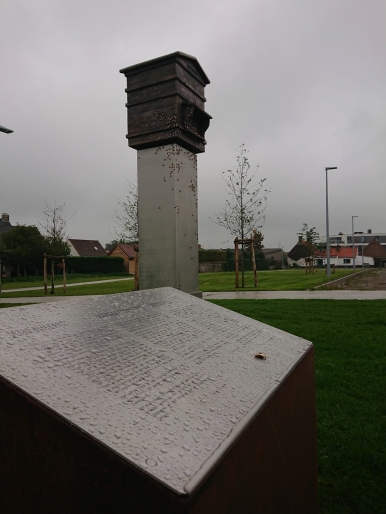ZEDELGEM | BELGIUM | EU | LATVIA | GLORIFICATION OF COLLABORATORS
◊
by Roland Binet (De Panne, Belgium)
The city council of Zedelgem, Belgium decided on December 3rd that the pro-Nazi Latvian “Beehive” monument, commemorating Latvia’s Hitlerist Waffen SS, will be removed. Three years ago, in a somewhat insidious and perverse manner, PR savvy reps of Riga’s “Occupation Museum” convinced the municipal council of Zedelgem in West-Flanders, Belgium, to allow them to unveil a monument honoring their wish for de facto whitewashing and heroizing of the 12,000 Latvian Waffen SS Legionnaires who had been detained in in a British detention camp in that town in 1945/1946. Indeed, the president of the board of directors of the Occupation Museum of Riga – a well-known Holocaust revisionist institution – and members of Dagavas Vanagi (an organization of former Latvian Waffen SS) were present for the monument’s festive launch. That event was primarily covered by the Flemish speaking press without any mention of possible issues, without in fact anybody asking any question of how it might have been possible that a Flemish town had allowed the construction of a monument in honor of former members of the Waffen SS, a Nazist organization whose members swore loyalty to Adolf Hitler, and who fought against the freedom of Belgium, and, in effect, all of Europe.
Nothing much happened until the beginning of 2021. The first person who reacted and tried to do something about what he perceived as a Nazi monument was Wilfred Burie, founder of the website The Belgians Remember Them which lists all known 4,000 or so flying personnel of Great Britain’s Royal Air Force who came down on Belgian soil during the war and states what happened to them. Through his intervention, a Belgian Minister of State, André Flahaut, officially questioned the Belgian Minister of Justice, but to no avail. My article on the subject appeared here in Defending History on March 8th. Later articles critical of the existence of what was called a Nazi or pro-Nazi monument in Zedelgem were published by local and international Jewish organizations and by the French-speaking press in Belgium. Then, on May 20, Michel Bouffioux published in Paris Match Belgique, a well-researched and eloquent lengthy article on this abomination; he kindly mentioned Wilfred Burie and myself for having raised the alarm in online publications. Then, later, thanks to the intervention of Flemish writer and painter Jan Vanriet who contacted Flemish journalists, a series of articles were published in Flemish-speaking newspapers, including some by mainstream American journalist Lev Golinkin, who is also a successful author. Some Flemish historians in Belgium started to state, tentatively at first, that this monument had to be removed. That it was a source of shame for Flanders. Which it is.
Later this year, it had been decided that a panel of international historians would need to look into this matter and propose a solution to the Zedelgem town council. This was done and yesterday, on December 3, the Zedelgem city council decided to remove the monument.
And now, what about Kaunas “2022 Capital of European Culture”?
and a new monstrosity in Vilnius?
This is a victory, in one sense, of a few resolute persons who, individually or collectively, with one single aim, wanted to have this pro-Nazi monument removed from Belgian soil. But in a much larger sense, it is a victory for both historic truth and elementary decency as staples of our new twenty-first century Europe.
Let us hope that never again will East European fascist thought, or its branch that invests so heavily in sanitizing local Hitler collaborators and their ongoing worship be allowed one centimeter of land in Belgium.
For a listing and history of media coverage and comment, see Wilfred Burie’s website.
